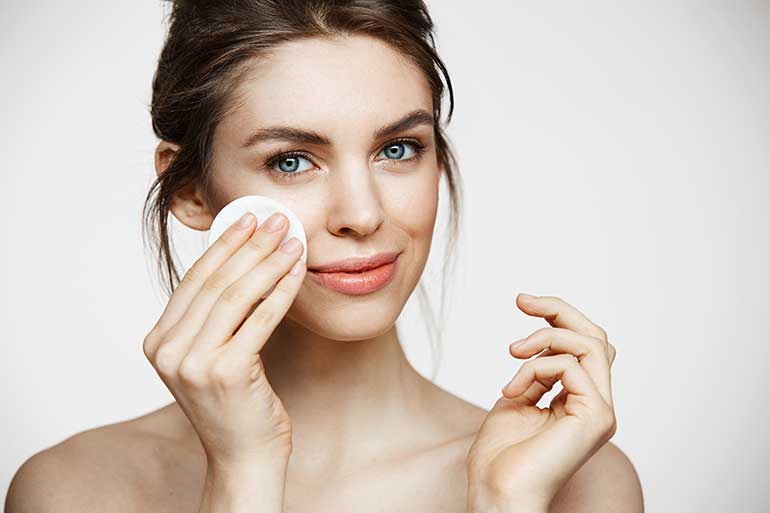The Path To Perfect Skin: Natural Remedies For Oily Skin
Skin health reflects a person’s well-being. The human skin needs a balanced amount of oil to maintain its moisture, slow down aging, and keep its elasticity. However, for some reason, a large portion of the population today endures the problem of oily and acne skin conditions. In this article we look at how you can keep oily skin at bay with some simple tips.

Skin health reflects a person’s well-being. The human skin needs a balanced amount of oil to maintain its moisture, slow down aging, and keep its elasticity. However, for some reason, a large portion of the population today endures the problem of oily and acne skin conditions. According to the International Dermal Institute, half of the adults have persistent oily skin and acne. And the fraction appears to affect women who are 25 years and older.
Oily skin is a dermatologic condition characterized by facial greasy appearance and sometimes, enlarged pores and acne as a result of excessive sebum production. But it should not be a permanent reason for distress. You can get rid of oily skin with the use of natural remedies.
The Major Culprits of Oily Skin
The underlying principle of excessive oil production can be multifactorial. But genes, hormones, diet, lifestyle, and external environment are the most recognized factors that contribute to oily skin.
Genes
Your genetic make-up can influence your skin type. If your parents have oily skin, you are likely to inherit it too.
Hormones
Hormones can be a culprit of oily skin complexion. Hormonal fluctuations during puberty, particularly the presence of androgens in boys, promote excessive production of sebum.
Diet
What you eat is what you are. Food affects your skin health. Processed, greasy, and oily food contributes to oily skin complexion.
Stress
Often, when you’re busy with work, business, or daily routine, you’ll tend to forget that you need some downtime. Stress can affect your health and skin, leading to acne flare-ups.
Environment
The pollutants can break down the natural protective mechanism of the skin. Extreme temperatures, such as winter or humid environments, can trigger the excess secretion of facial oils.
Natural Ways For Oily-Free Skin
Observe a healthy diet
A healthy diet alone does not cure oily skin, but it may influence it. High intake of refined carbohydrates and fats stimulate the overproduction of sebum. The Journal of Derma-Endocrinology illustrates the relationship between diet and acne. Researchers found out that Western diets, which have significant fat and carbohydrate content, provoke inflammatory processes that can trigger acne development. On the contrary, people from non-Western countries like Papua New Guinea, who consume a low-glycemic diet combined with lots of fruits, vegetables, and lean meats, show lower acne risk.
Stay Hydrated
Better skin health is associated with increased water consumption. Keep skin hydrated by drinking a minimum of 1.5 L of mixed fluids. Find balance on what you drink. Limit sugary drinks. Beverages that contain a lot of sugar can trigger sebum production. On the other hand, caffeine and alcohol are dehydrating to the skin, which can trigger the overproduction of sebum resulting in oily skin.
Cleanse regularly
Wash face twice a day – that is, in the morning and before going to sleep. Do not over wash as it can be counterproductive for people with oily skin. The Journal of Clinical and Aesthetic Dermatology recommends the use of a foam wash that contains zinc sulfate. Zinc sulfates cleanse the skin, maintain skin pH, and remove skin debris, particularly sebum. Lather any foam wash preparation on the face with particular attention on the T-zone.
Exfoliate
Exfoliation is the process of washing and rubbing skin using a granular material. It wipes out excessive oil, cleanses clogged pores, and removes dirt. Exfoliate 2 to 3 times a week, and no more than that. Look for exfoliants that contain salicylic acid and charcoal.
Remove your makeup at night
Never sleep with makeup on. Not washing makeup off before bed not only worsens acne, but it is generally bad for skin health. Applying a cleanser toner also helps brush off dead skin cells and bacteria that can come from brushes and makeup products.
Blot skin frequently
Carry a blotting paper with you all the time. Blotting paper is a convenient accessory to help skin appear less oily without regular application of facial powder or makeup. Blotting paper strips off extra facial oil and helps reduce acne.
Apply a clay mask
Clay mask is a type of facial mask that contains bentonite or kaolin, the two main ingredients that absorb facial oil, manage dry skin, reduce clogged pores, and arrest acne formation. It is a great mask of choice for people who have very oily and acne-prone skin types. Use clay mask 2 to 3 times a week after bath or shower.
Try some honey
The Central Asian Journal of Global Health revealed the therapeutic uses of honey when it comes to managing skin disorders. Honey has a skin-healing effect that helps manage skin disorders associated with sebum overproduction. Further studies have demonstrated that it has antimicrobial and antiseptic properties that not only relieve wound infection but also inhibit the growth of Propionibacterium acnes that causes acne problems.
Moisturize routinely
Look for moisturizers with SPF 30. Moisturizers with SPF 30 are oil-absorbent, and therefore, helpful for oily skin. They also reduce facial shine for hours and make skin less greasy without any facial burning or stinging.
Keep stress at bay
Practice mindfulness for healthy skin. Stress prompts cortisol release, which can contribute to excessive oil production. It also triggers the inflammatory process of the body, causing skin irritation and flare up like acne. Develop mindfulness by focusing on breathing, getting fresh air during long work hours, meditation, laughing, and exercising.
Conclusion
Excessive oily skin is a common condition affecting mostly young adults caused by various reasons. Chronic oil production can stir concern for some people, but having oily skin should not be a permanent plight. There are natural ways to improve the appearance of facial greasiness without employing harsh and expensive products. Proper diet, hydration, regular facial cleansing, and managing stress are natural and effective ways of treating oily skin and clearing acne.


















